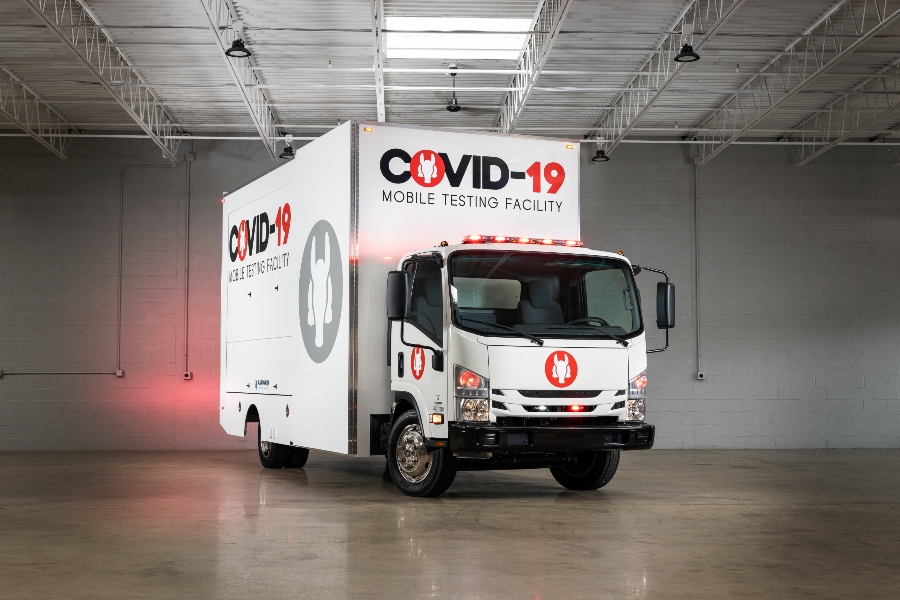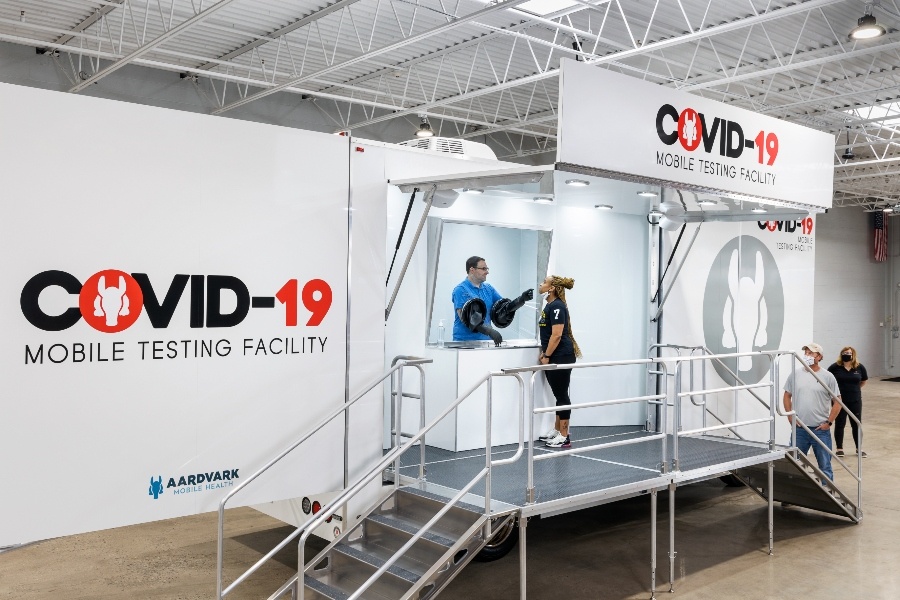NextUp: The Local Company Building a Fleet of COVID-19 Testing Trucks

Aardvark Mobile Health has created a fleet of portable healthcare vehicles designed to bring safe and efficient COVID-19 testing to vulnerable populations. / Courtesy
“NextUp” is a weekly NextHealth PHL feature that highlights the local leaders, organizations and research shaping the Greater Philadelphia region’s life sciences ecosystem. Email qmuse@phillymag.com with pitches for NextUp.
Who: Larry Borden has had a knack for marketing since he was a young kid selling his services as a reliable neighborhood lawnmower. In the 90s, he helped promote everything from the release of new Tonka trucks to Sony’s PlayStation. Along the way, Borden learned just how fragmented the mobile marketing industry was. At the time, companies had to rely on multiple vendors for product launches because there weren’t any companies that offered both the custom-built vehicles that they could emblazon with logos to promote their products and the logistical support needed to ensure those vehicles were able to reach as large an audience as possible. In 2007, Borden founded Aardvark Mobile Tours with hopes of becoming the go-to full-service marketing agency for mobile promo tours. The company now has a team of over 200 employees at its headquarters in Conshohocken.
What: Aardvark works with large brands like Coca-Cola, Dietz & Watson, Pepsi and Starbucks to help them market, sell or provide samples of their products on the go via mobile vehicles, or as Borden put it, “We build really cool trucks here in Pennsylvania, we decorate those trucks, and we put drivers in them. We focus on all the logistics so our customers can focus on everything else.”
At one point the company had as many as 66 mobile retail trucks on the road for T-Mobile, for example. Then the pandemic hit the region in mid-March bringing nearly all events and non-essential businesses to a halt.
“It’s been catastrophic for a big part of our business because a lot of the stuff we do revolves around people attending events,” he said. “We literally went from all-hands-on-deck, selling like crazy, to a complete shut down for about 90 percent of our programs.”
When Borden realized many of Aardvark’s programs weren’t going to be able to operate for the foreseeable future, he started thinking of what the company could do to stay afloat. One Saturday morning, he read an article about a company in Israel that was taking shipping containers and turning them into mobile COVID testing facilities. The sites were helpful but somewhat inefficient in that they lacked electricity and portability.
“And a light bulb came on,” Borden said. “I thought, we have vehicles that we’re currently using for our clients, that with very small modifications, we can turn into mobile COVID testing trucks. And that’s basically what we did.”
Following the same model the company had used for its marketing business, Aardvark shifted its focus to begin providing the infrastructure, drivers, and vehicle maintenance for a fleet of trucks that health systems, city and state governments can use to collect samples and perform coronavirus tests.
When: In June, as Florida began emerging as the epicenter of the pandemic, the Florida Division of Emergency Management entered into a partnership with Aardvark Mobile Health. The partnership currently includes the deployment of one of the company’s mobile COVID-19 testing trucks in the greater Miami area. Since June 29th, the truck has been traveling throughout Miami, enabling local health professionals to test up to 200 people a day.
What it means: At the moment, most mobile testing sites are inconvenient at best for either the health professionals administering the tests or the patients receiving them. Drive-thru COVID testing sites require health professionals to stand outside, often in the sweltering heat, with only tents and fans for relief. There’s also the very valid complaint that drive-thru testing sites ostracize patients who want to get tested but don’t have cars. Though testers practice and encourage social distance, mobile COVID testing sites still tend to gather relatively large groups of people in one space, possibly increasing the risk of spreading infection.
“Without our truck it’s either everybody’s outside or everybody’s inside,” Borden explained. “There really is no way that we know of, other than our trucks, to do testing where the patient is on the outside and the tester or the collector is on the inside under air conditioning, and that’s really what’s needed for safe COVID testing.”

Aardvark Mobile Health has created a fleet of portable healthcare vehicles designed to bring safe and efficient COVID-19 testing to vulnerable populations. / Courtesy
Aardvark’s testing trucks feature a unique partition that enables sample collectors to remain inside, in an air-conditioned environment while patients can walk up to the vehicle to be tested. The trucks also feature a generator for electricity and operable wheels so the site can be packed up and relocated in as little as 15 minutes. The patented trucks are designed to bring testing directly to communities, rather than making community members go out of their way for testing and eliminating the need for a car to drive through.
Aardvark’s trucks can accommodate up to 200 sample collections per day. That doesn’t quite compare to most drive-thru sites that process roughly 500 tests per day on average, but Borden says the company has plans of adding a second window to its trucks in the near future. That would double their output to 400 sample collections per day, putting Aardvark almost on par with your average drive-thru COVID-19 testing site. Aardvark also offers a screening truck that is designed for conducting temperature checks and additional symptomatic screenings of people prior to entering any location with a large gathering such as office buildings, warehouses, military bases, convention centers, and sporting arenas in order to mitigate the risk of COVID-19 spread.
Health and government entities can purchase Aardvark’s trucks outright (though the company declined to name their price), or they can purchase a service contract with the company to gain use of the truck, a driver, all maintenance and logistical planning for an agreed-upon period of time. Aardvark is currently negotiating with health systems and government officials in at least 40 states about possibly deploying mobile COVID testing trucks in cities across the country.
Why it matters now: Increasing access to COVID testing is a priority, especially in marginalized communities, where residents often face barriers to accessing testing sites. Testing will also be critical to understanding how the pandemic will evolve in the fall and beyond.
If strategically placed in areas of need, Aardvark’s mobile testing sites could help improve the country’s capacity for testing.
Borden’s team is also thinking beyond the pandemic when testing is no longer needed. He says, in as little as an hour, Aardvark’s testing trucks can be converted and used for vaccine administration, screening services or lab services.
“The vehicles are very, very flexible and built in a way that you can use them for multiple things,” he said. “So, one investment for a municipality or a company can allow them to keep using these vehicles for different purposes over a long period of time.”
On a personal note, Borden says the company’s new focus on mobile health services has given his team a renewed sense of purpose.
“This is really impacting our employees a lot more than I had thought it would. I think we all feel like we have a real purpose now because we know, the more trucks we can get on the road, and the faster we can do that, the more people can get tested and get treatment,” he said.
“The earlier you get diagnosed, the quicker you can get treatment and hopefully have a better outcome. When we think of that, there is a sense that we could potentially be saving lives.”


